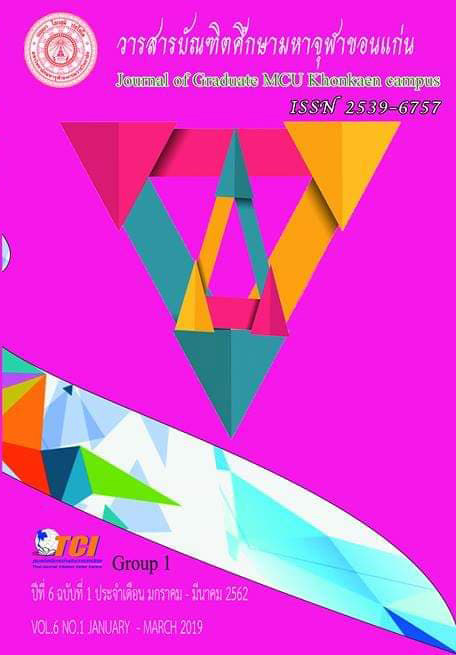The Lean Factors Affecting Transportation and Warehousing for Waste Reduction and Value Added
Main Article Content
Abstract
Lean concepts is one of the principles that have been very interested in the present and it is likely to be used increasingly. Lean concepts is a philosophy of production that aims to reduce waste. Lean production system is a process management tool to help empowering the organization by considering the value of the operation to meet the needs of customers create value in goods and services and eliminate all the losses that occur with the process continues. It can reduce production costs, increase profits and good business results in the end. Lean system will send orders based on actual demand from the store to the customer..
The demand function is called Pulling system and reference. Pulling and linking inventory through supply chain. The problem of education is Lean used in shipping and warehousing has not yet been fully implemented to adjust to reduce the loss as much as possible by adding value and efficiency to meet the needs of customers to reduce costs, reduce unnecessary steps. All process analysis and increase the value of personnel to keep the process running smooth. The objective of the study were 1) To study the lean factor affecting waste reduction and the increased value of manufacturers that used transportation and warehouse services 2) To study the impact of factors which affected waste reduction and the increased value of manufacturers using transportation and warehouse services 3) To study the influence of factors affecting the value added of transportation and warehousing services, and 4) To create a model of lean factors that affect transportation and warehousing to reduce wastage and increase value. The research found that. The overall quality management factor is very important. The overall of flow is very important. The overall of management is very important. Modeling of the structural equation of lean factors that affect transportation and warehousing to reduce wastage and add value is appropriate and consistent with empirical data. Based on the statistics used to validate the consistency between models and empirical data. Considering the validity of the observed variables. This research presents a Lean Factors of Transportation and Warehousing Model by In-depth interviews with logistics providers prove the model leading to actual use. Suggestions in the next research is to study of Lean Factors Affecting Transportation and Warehousing to Reduce Waste and Add Value by classifying business or studying variables and other variable theories. This is a guideline for further development of the research model.
Article Details
References
of Finished Garments Case Study of the Production of Polo Shirts.
Master of Engineering Thesis, Textile Subject Department of
Textile Engineering Faculty of Engineering: Rajamangala
University of Technology Thanyaburi.
Chatchaya Jianswatvatana. (2016). Lean logistics - increase efficiency Reduce
wasted losses. Online. Retrieved January 2 8 , 2 0 1 7 . from:
http://thai.logistics-manager.com/2016/01/18/ Lean logistics/
Chanyanut Phunaten, et al. (2 0 1 5 ) . Lean production in industrial plants.
Statistics Faculty of Science : KhonKaen University.
Hair, J.F., Anderson, R.E., Tatham, R.L., & Black, W.C. (2006). Multivariate
Data Analysis. (5th ed.). Upper Saddle River, NJ: Prentice Hall.
Kamonchanok Sutthiwatnaruephut. (2009). Management for CompetitivenessNew Model. Chulalongkorn Business Review, 122(66), 66-74.
Kumnai Apipatyasakul. (2 0 0 3 ) . Logistics and Supply Chain Management.
Bangkok : Nattaporn.
Michael A. Hitt. ( 2 0 0 6 ) . Strategic Management. Translated by Ekachai
Apisakkul and Boonkwan. Bangkok : Chulalongkorn University.
Nonglak Nimitphuwadol. ( 2 0 1 4 ) . The Study of Waste Reduction in
Warehouse Processes Using Lean Concepts, Case Studies of the
Furniture Industry. Online. Retrieved January 2 4 , 2 0 1 7 . from:
http://www.mgts.lpru.ac.th/journal/index.php/mgts/article/view/9 9 /7
1
Prapasri Phongthanapanich. (2 0 1 2 ) . Lean Production Management.
Nonthaburi: Sukhothai Thammathirat Open University.
Rungroje Songsraboon. (2 0 1 6 ) . Factors influencing the operation of private
hospitals in Thailand. Journal of Thonburi University, 1 0 ( 2 2 ),
80-88.
Sawang Rongkasiriphan. (2 0 1 2 ) . Effective Transportation Management.
Online. Retrieved January 2 8 , 2 0 1 7 . from :
http://www.geniustraining.co.th
Thanayutsite. (2006). Key principles of problem solving and decision making.
Online. Retrieved December 26, 2017. From : https://thanayutsite.
wordpress.com
The Federation of Thai Industries. (2 0 1 7 ) . Inventory Management. Online.
Retrieved January 28, 2017. from : https://www.fti.or.th/2016/thai
Ubonwan Onto. (2 0 08 ). Application of Lean Production Systems and Value
Plans by Simulating the Situation in tire Production. Master of
Engineering Thesis. Department of Industrial Engineering :
Chulalongkorn University.
Winai Sutthi, et al. (2 0 0 3 ) . The Use of Kambans for automotive Parts
Factories to Reduce the Amount of Finished Products. Master of
Engineering Thesis Faculty of Engineering: Thammasat University.
Wipada Thongkliang. (2 0 1 7 ) . Quality Management. Online. Retrieved
December 3, 2017. from: https://www.gotoknow.org/posts/449253

